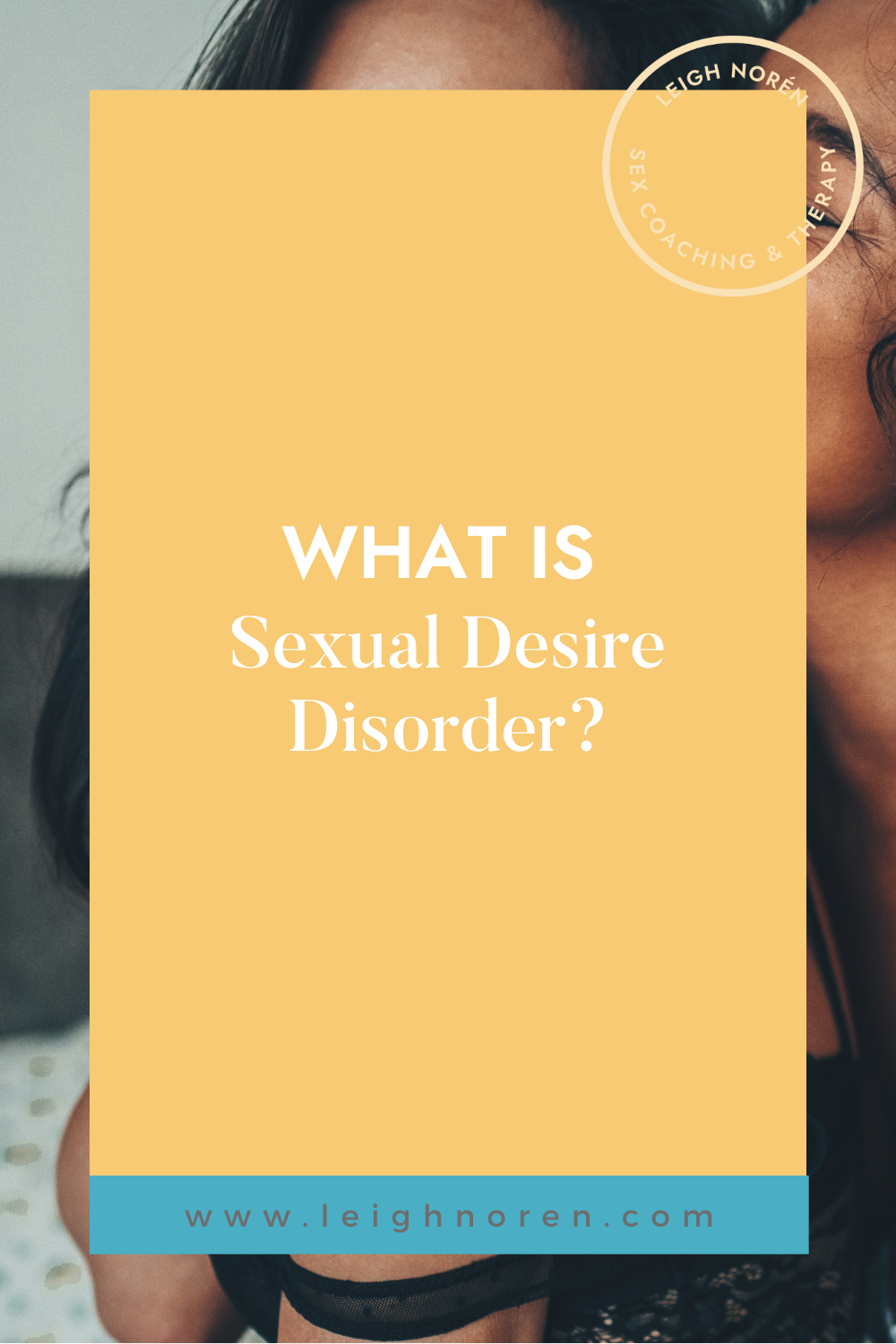What Is Sexual Desire Disorder?
First published 16st August, 2023. Updated 31th March, 2025.
8 min read
In this article
Is it possible I have a sexual desire disorder—and if so, what does that really mean for me, my partner and our sex life?
Most of us equate disorders with getting help from a professional. But opening up to a sex therapist can feel intimidating (to say the least!). It’s a huge step to talk about sex with a professional—especially when it’s already difficult to bring up the topic with your partner.
And let’s be real, one of the scariest thoughts usually is: what if my therapist confirms my deepest fear—that there’s actually something wrong with me?
As a sex therapist myself, I’ve sat with countless clients in exactly this position. And while a diagnosis can sometimes feel like a relief, it can also leave you feeling worse.
Because the term ‘sexual desire disorder’ carries an underlying message many of us fear: that we’re broken.
What Does Sexual Desire Disorder Mean?
Before we dive into whether these kinds of diagnoses are helpful or not, let’s first clarify what they are.
The DSM (Diagnostic and Statistical Manual of Mental Disorders) outlines a number of conditions that need to be met to get a diagnosis.
There are two commonly used diagnostic labels for low desire:
- Female Sexual Interest/Arousal Disorder
- Male Hypoactive Sexual Desire Disorder
Some important things to understand before we dive deeper are:
- The word “disorder” implies dysfunction. When I use it here, I’m referring to medical language—not a personal belief.
We’ll look into why this language can be problematic a little later.
- The categories are gendered. This asks the question: what about people who don’t identify strictly as male or female? And are we assuming desire differs fundamentally based on sex?
- The female diagnosis includes both desire AND arousal difficulties. But these are not one and the same thing. You can read more about this in my blog post on sexual desire vs sexual arousal). The male version focuses solely on desire. Men’s arousal issues (referred to as Erectile Dysfunction) fall under a different diagnosis.
These questions above are widely debated among experts in Sexology—but I’m guessing you didn’t come here for a scientific lecture. So let’s crack on.
What the Diagnoses Actually Involve
Despite their gendered labels, the criteria for both conditions are quite similar:
- The symptoms must be present for at least six months
- The cause shouldn’t be better explained by a different health or mental health issue
For example, if you’re taking a medication that dampens your desire, it may not be Female Sexual Interest/Arousal Disorder or Male Hypoactive Sexual Desire Disorder but rather may be categorized as Substance or Medication-Induced Sexual Dysfunction - You must feel personally distressed by the lack of desire
If you’re not suffering in regards to your low libido, it won’t be labelled as a disorder.
What Does Sexual Desire Disorder Look Like?
Female Sexual Interest/Arousal Disorder (FSIAD) symptoms include:
- Not having sexual thoughts or fantasies
- Little or no pleasure during sex
- Feeling uninterested in sex most of the time
- Avoiding intimacy or not initiating it
- Rarely engaging in sexual activity, alone or with a partner
With Male Hypoactive Sexual Desire Disorder (HSDD), the core signs are:
- A lack of sexual thoughts or fantasies
- Reduced interest in sexual activity
As you can see, the separate diagnoses definitely overlap showing that all genders can experience symptoms of a sexual desire disorder.
So, what does it mean to be diagnosed with low desire and how can it be helpful and unhelpful alike?
WANT YOUR SEX DRIVE BACK?

My free resource The Desire Test helps you take that first step towards an increased sex drive, by understanding your decreased desire.
Take the 10-page assessment quiz, get the answers you need to understand what’s standing in the way of your desire, and get free sex and relationship tips directly to your inbox. You can unsubscribe at any time.
Can A Diagnosis Help Boost Desire?
In short; it might. But it depends on who you’re working with and how they approach your treatment.
Getting a diagnosis can validate your experiences of low or no sex drive). But one of the biggest benefits is that it guides next steps.
Because to create a meaningful treatment plan, therapists need to first assess what’s going on—and a diagnosis does this.
A diagnosis also guarantees that the treatment you receive is evidence-based. This basis in sexual science is required for us to know what really works.
Without it—we wouldn’t know how to treat anything. The problem though, is that un-diagnosed sexual health issues aren’t often funded by research grants. This in turn, means that we need to put labels on things for researchers to actually get paid to understand phenomena such as low sexual desire.
So, if you’re looking for a scientifically informed path forward, a diagnosis can be useful.
That said, if the label itself makes you feel discouraged and broken, it might work against your progress.
What Other Benefits Can A Diagnosis Offer?
Plenty. A diagnosis can unlock access to care and in some cases, make insurance coverage possible.
But let’s be honest: many sexual health issues are still considered non-essential by insurers. And because you’re here reading this, I’d imagine you’d disagree.
Sexual issues impact our sense of self, our relationships, and our mental health. They are not “champagne problems”.
Beyond treatment access, a diagnosis can bring clarity.
It can help explain why sex has become stressful or why your fantasies have faded. It can make sense of why it feels like your sex drive has vanished. It can be what you need to hear that gives you the tools to revive your relationship.
Sometimes, just having a name for what you’re going through brings comfort—and hope.
Does it Mean I’m Broken?
That depends on how you view it—and how the professional you’re working with does, too.
As someone trained in both therapy and coaching, my goal is to help you feel whole again.
Because losing desire often makes complete sense.
You just need space and guidance to figure out the why behind it all.
When I work with clients, I explore all potential causes of low desire—but never from the angle that something is “wrong” with you.
We look at emotional, psychological, and relational aspects with curiosity and compassion. This way, we can create a tailored path that is based on understanding and empathy. Not rigorous treatment of disorder.
From there, you can:
- Choose whether you want to reignite desire (because at the end of the day, we don’t always want desire back)
- Move forward from a place of self-understanding—not shame
What’s The Issue With Labels Like FSIAD And HSDD?
Labels used in therapy can sometimes feel harmful.
One reason I moved more into sex coaching is because I wanted to get away from pathologising sexual difficulties, as we in sex therapy.
Because yes, diagnoses can help people get support and proper treatment. But the terminology can feel cold, clinical, and even stigmatising.
Libido isn’t simply a basic urge like hunger or thirst. It’s shaped by our life, our mood, our relationships—everything. And the field of Sexology is still developing. There’s a lot we have left to learn and understand about sexual desire, identity, and connection. And hopefully, this can bring us away from the harsh diagnoses and terminology.
Desire Isn’t As Straightforward As We Think
Getting diagnosed with a disorder can leave you feeling like something inside you is broken.
Because labels—especially clinical ones—come with heavy baggage.
Sure, they’re often needed for us sex therapists to get compensated by insurance companies. But that doesn’t make them any easier to hear for our clients.
They risk turning human sexuality into a rigid template. Defining how we should all experience something as unique as desire in exactly the same way.
And when our real-life experiences don’t fit that template, we start to wonder what’s wrong with us.
But my clinical experience has taught me that desire is layered and deeply personal.
For instance, the idea that desire is always a spontaneous reaction is more myth than reality.
And with this myth, we might put labels on feelings that aren’t disordered at all—and that are, in fact, completely normal.
What I Won’t And Will Say
This is not a black-and-white issue.
I (of course) value research and the wealth of knowledge it brings to my profession. But in sessions with my own clients—I try to avoid medicalised labels.
I won’t tell you there’s something wrong with you. Because more often than not, there isn’t.
I won’t tell you there’s a specific number of times you should be having sex per week.
And I certainly won’t call you broken.
What I will do is help you make sense of your experience and why you do not want sex.
I’ll tell you that your anxiety is valid.
That millions of people share your concerns (because they do).
And that yes—change is possible.
Label Or Not – Your Desire Can Come Back
When asking “what is sexual desire disorder?”, we need to take a broader view.
Because while diagnoses can lead to support, research, and better treatment, they can also make us feel boxed in. Broken. Misunderstood.
And the truth is, there are so many ways to reconnect with your desire—most of which don’t require a diagnosis.
What really matters is having a safe space to be seen, heard, and understood.
And that’s possible—with or without a label.
Ready To Reclaim Your Desire – Without Shame?
If you want support in getting your sex drive back—without labels, pressure, or shame—I’d love to support you through Re:Desire.
Re:Desire is a 5-phase, 1:1 coaching programme designed to reduce sexual stress, rebuild closeness, and help you rediscover desire. Built on sexual science, but without the disordered angle.
Click here to learn more and take your first step toward stress-free intimacy.

Zero sex drive?
You’re not alone! Download the 10-page Desire Test to find out why your desire for sex is gone (and what to do about it).
Questions based on a variety of factors proven to negatively affect desire
Find out which factors are responsible for your low or non-existent sex drive
Get instant access to expert advice, delivered directly to your inbox when you download The Desire Test. Unsubscribe anytime.
WANT TO KNOW MORE ABOUT THE DESIRE TEST?
With 9 years of experience as a sex therapist and coach - Leigh helps her clients create stress-free, shame-free, pressure-free sex lives, through her unique combination of sexological science, & psychotherapeutic & coaching tools.
OTHER POSTS YOU MIGHT ENJOY
Copyright © 2019-2026 Leigh Norén. All Rights Reserved. | Website by Pinegate Road
Cookie policy | Terms & Conditions | Privacy Policy


